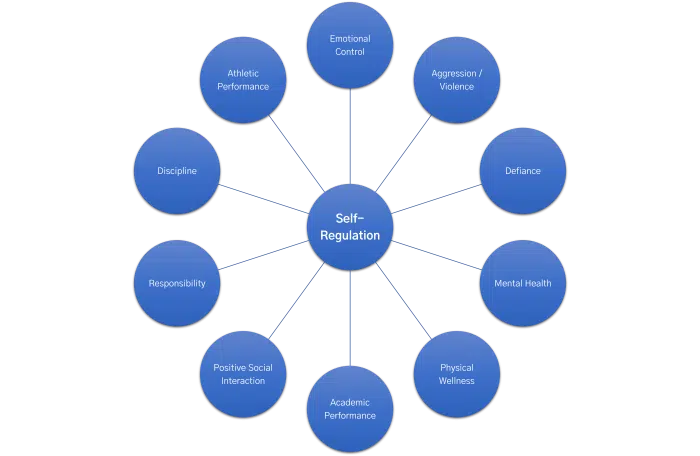Blog » Coaching Models and Techniques » The Self-Regulation Theory
The Self-Regulation Theory
Coaching is often seen as a powerful tool for personal improvement and growth today. But how does one become an effective coach? This is where the self-regulation theory comes into play.
This article looks at the self-regulation theory, a way of becoming an effective coach by understanding our behaviors and regulating them to create positive change – both for ourselves and our clients.

What is the self-regulation theory
Self-regulation theory is a psychological framework that describes how individuals control and manage their own behavior, emotions, and thoughts. It is based on the idea that people can set goals and adjust according to their progress.
This involves several stages, including setting goals, planning and implementing strategies, monitoring progress, and evaluating outcomes. A range of factors, including motivation, emotion, cognitive processes, and social support, influences self-regulation.
One of the key ideas in self-regulation theory is that self-control is a limited resource. This means that individuals have a finite amount of self-control that can be depleted over time, leading to a reduced ability to regulate behavior, emotions, and thoughts. Additionally, self-regulation can be enhanced through practice and training.
Self-regulation theory has important implications for understanding various behaviors, including addictive behaviors, academic achievement, and interpersonal relationships. It can also be used to develop interventions to improve self-regulation and reduce problematic behaviors.
Benefits of self-regulation theory
Self-regulation theory offers several benefits for understanding human behavior and developing interventions to promote positive outcomes.
Firstly, it emphasizes the importance of personal agency and control over behavior, emotions, and thoughts. This can lead to increased feelings of self-efficacy and empowerment, which are associated with better mental health and well-being.
Secondly, self-regulation theory provides a framework for understanding why some individuals struggle with self-control and how to support them in developing these skills. This can be especially relevant in the context of addiction, where self-regulation deficits are a key feature.
Thirdly, self-regulation theory has implications for educational settings, where self-regulated learning can improve academic achievement. Educators can help students develop important skills for success in school and beyond by teaching them self-regulation strategies.
Finally, self-regulation theory has practical applications in developing interventions to promote positive behaviors and reduce problematic behaviors. For example, interventions focusing on building self-control skills have been shown to effectively reduce substance use and improve mental health outcomes.
Limitations of self-regulation theory
Despite its many benefits, self-regulation theory has several limitations that should be considered when applying it to different contexts.
Firstly, self-regulation theory tends to focus on individual-level factors and may overlook the influence of social and environmental factors on behavior. This can limit its usefulness in understanding complex social phenomena, such as health disparities or systemic inequalities.
Secondly, self-regulation theory may not fully capture the cultural diversity of self-regulation processes. For example, some cultures may place a greater emphasis on social control rather than individual self-control.
Thirdly, the theory assumes that self-regulation is a conscious and intentional process, but in reality, many behaviors are automatic and unconscious. This can limit the applicability of self-regulation theory to certain behaviors, such as habits or impulsive actions.
Finally, self-regulation theory may not fully account for the role of emotion in self-regulation. Emotions can be powerful motivators of behavior and can interfere with self-control in certain situations.
How the self-regulation theory Works
The process of self-regulation typically involves several stages:
Setting Goals: Individuals identify a desired outcome and set a goal to achieve it.
Planning and Implementing Strategies: Individuals develop and implement strategies to achieve their goals, such as breaking a larger goal into smaller, more manageable steps.
Monitoring Progress: Individuals track their progress towards their goals, assessing whether their strategies are effective or need to be adjusted.
Evaluating Outcomes: Individuals assess the outcomes of their efforts and adjust their strategies accordingly.
Several factors influence self-regulation, including motivation, emotion, cognitive processes, and social support. For example, individuals may be more likely to achieve their goals when they have
- a strong motivation to do so,
- when they can manage their emotions effectively,
- when they have the cognitive skills needed to plan and implement effective strategies,
- when they receive social support from others.
Self-regulation can be enhanced through practice and training. For example, individuals can develop self-regulation skills by setting small goals and gradually increasing the difficulty of their tasks over time. They can also benefit from interventions that provide support and guidance, such as cognitive-behavioral therapy or mindfulness-based interventions.
Applying self-regulation theory in Coaching
Self-regulation theory can be applied to coaching to help clients set and achieve goals, monitor their progress, and adjust their behavior and strategies as needed. Coaches can help clients develop self-regulation skills by:
Setting specific, measurable, achievable, relevant, and time-bound (SMART) goals with their clients.
Helping clients develop action plans that break down their goals into smaller, achievable steps.
Providing regular feedback and monitoring progress towards goals.
Encouraging clients to reflect on their progress and adjust their strategies as needed.
Supporting clients in developing self-awareness, managing emotions, and building cognitive skills related to self-regulation.
Coaches can also use techniques such as cognitive-behavioral coaching, mindfulness-based coaching, or positive psychology coaching to help clients develop self-regulation skills.
By helping clients develop these skills, coaches can support them in achieving their goals, building confidence and self-efficacy, and improving their overall well-being.
Conclusion
The self-regulation theory is useful for psychologists, coaches, and other professionals working in various settings because it provides a comprehensive framework for comprehending human behavior and encouraging beneficial outcomes.
Although the self-regulation theory provides a useful framework for comprehending human behavior, it is critical to be aware of its limitations and consider alternate viewpoints where appropriate.
Frequently Asked Questions
What are the examples of the self-regulation theory?
Examples of the self-regulation theory include:
An individual setting a goal to exercise regularly and implements a plan to achieve it, such as scheduling workout times and tracking progress.
A student setting a goal to improve their grades and implementing study strategies, such as breaking down assignments into smaller tasks and using mnemonic devices to aid in retention.
A person trying to quit smoking use strategies such as avoiding triggers, distracting themselves during cravings, and monitoring progress using a quit-smoking app.
Professionals use self-regulation strategies to manage their emotions and stress levels, such as taking breaks throughout the day, using relaxation techniques, and practicing mindfulness.
In each of these examples, the individual sets a goal, implements strategies to achieve it, and monitors progress, highlighting the importance of self-regulation in achieving success.
What are the characteristics of self-regulation theory?
Characteristics of self-regulation theory include a focus on goal-setting, monitoring, and adjustment; recognition of the role of motivation, emotion, and cognitive processes in behavior; and the belief that self-regulation can be enhanced through practice and training.


ABOUT SAI BLACKBYRN
I’m Sai Blackbyrn, better known as “The Coach’s Mentor.” I help Coaches like you establish their business online. My system is simple: close more clients at higher fees. You can take advantage of technology, and use it as a catalyst to grow your coaching business in a matter of weeks; not months, not years. It’s easier than you think.
AS SEEN ON
0 Comment